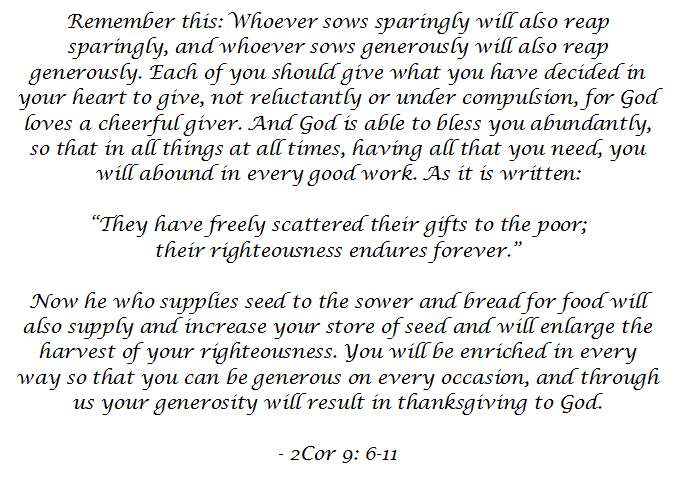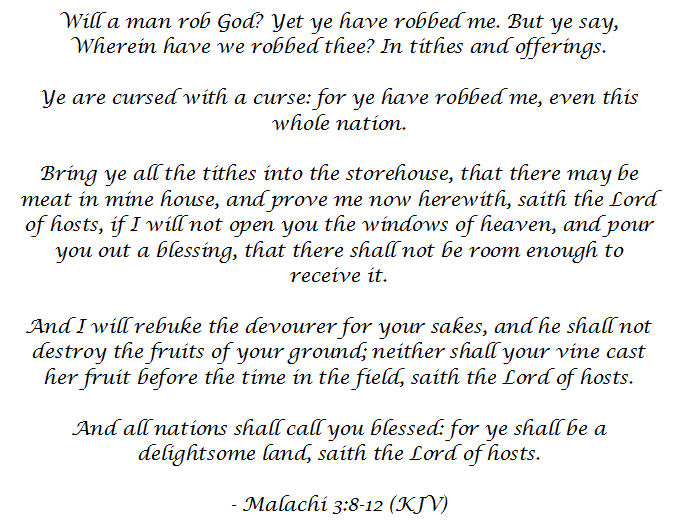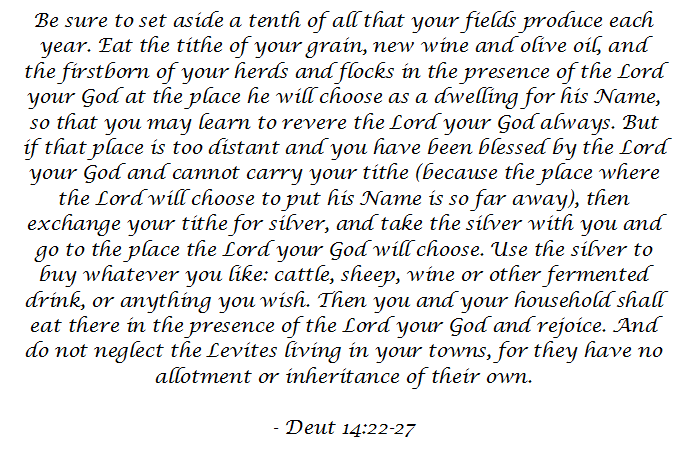Today I am going to let you into the Church’s big secret on tithing.
I’m going to share with you a Scripture that you will never hear preached on from any pulpit you can think of.
But first, a bit of background.
Like quite a few other doctrines*, the doctrine of ‘Tithing’ is a contentious one. It refers to the practice of giving to the Church, or whatever religious organisation a person is part of, a certain proportion of (or sometimes a set amount of) one’s income. Usually, this proportion is one tenth of one’s income.
It’s not only contentious within a group; it’s usually contentious outside the group as well, in that one of the big turn-offs for non-churchgoers is the idea that giving money to some random (and usually non-accountable) organisation is not something that sane people would do. They just can’t believe that anyone would want to do that, and they want no part of it. And I don’t blame them. I can still remember one time before I became a Christian, hearing that the Jehovah’s Witnesses** give a tenth of their income to their Organisation. My response was something like, “They do what??!!” And that sentiment is shared by many, both inside and outside the church.
Of course, there are many varied practices involved in this giving model, in fact probably about as many as there are churches. I have shared before on this subject, and it is probably worth reading at least this article before you read this present article, for a bit of background, and my lead-in for this other article for more. However the later part of that last article does go into some pretty heavy Biblical study and is probably best left alone for the time being.
Suffice it to say that many Christian denominations and organisations have of course abused the ideas around tithing and made it a legalistic practice instead of a Grace-filled one. Drawing on predictable bullying, carrot-and-stick, and straightforward prosperity-doctrine tactics, they have set up a whole mythology around tithing, usually promising good returns on one’s tithe by emphasising certain Scriptures and, of course, ripping them brutally out of their proper context to serve their own ends, and ignoring completely Jesus’s teaching on giving being a secret practice between God and Man, and not done for the approval of humans (Mt 6:1-3). I won’t even begin to go in to the convoluted arguments and justifications that money-grabbing religious organisations use to extort money and other things from their people. It’s sickening, though.
You have probably gathered by now what I think about this 😉
But let’s look at the two main Scriptures abused used by some Christian groups to ‘encourage’ (a euphemism, folks!) people to give the whole tithe (meaning the whole ten per cent, although I have never once heard a church moan about anyone giving more).
The first is, naturally, an Old Testament (OT) text; the OT of course being the number-one destination for preachers wanting to find a choice verse to introduce yet another Rule to weigh down their people with. You want Rules? Begin with the OT. This is simply because few people know much about the OT, its background, and the cultural references in there, and in any case it all sounds (and reads) very stern and forbidding, and the god of the OT is a right misery who is pretty pissed at most people for most of the time anyway.
Here’s the main verse used in this way. I’ll leave it in the KJV language to make it sound more authoritative and threatening. Ladies and gentlemen, I present to you the number one tithing text: Malachi 3 verses 8-12!
(Mal 3:8-12 (KJV))
There is so much wrong with using this Scripture in the typical combination manner it is usually used: the carrot-and-stick approach to tithing – the carrot being the ‘promise’ of blessings, and the stick being the promise of a ‘curse’. I’m afraid I’m not going to give an exegesis of this passage right now, because I’m trying to get to my point!
The second Scripture normally thrown at believers about tithing is in 2Cor 9:6-15, of which I will present just verses 6-11.
 Note how the latter part of the preceding verse, verse 5, (2Cor 9:5) is always missed out (so they begin the reading at verse 6), verse 5 being the bit about not giving grudgingly (and this omission is excused because in the most popular translation, the NIV (New International Version) it comes before the ‘heading’ (inserted by the translators) of ‘Generosity Encouraged’).
Note how the latter part of the preceding verse, verse 5, (2Cor 9:5) is always missed out (so they begin the reading at verse 6), verse 5 being the bit about not giving grudgingly (and this omission is excused because in the most popular translation, the NIV (New International Version) it comes before the ‘heading’ (inserted by the translators) of ‘Generosity Encouraged’).
When hearing this Scripture read out in public, you will also hear verse 7 (about ‘reluctantly or under compulsion’) being skipped over without emphasis, maybe even read in a quieter voice, or maybe faster so you don’t hear it. Or a combination of these tricks. (Yes, these deceptive practices do indeed go on! And it makes outsiders sick and repelled by the whole business). And this is how the context of this verse is destroyed. But again it’s the carrot approach – although this time no stick – but even then some people would in fact take the ‘grudgingly/reluctantly/compulsion’ bit and make it condemnatory: that it is the giver’s fault that they feel like that. But I have ranted enough. And you can believe that you will never, ever, hear or read me preaching on the subject of giving in this manner.
Now at last I want to share with you the Scripture you will never hear read publicly, at least not from someone who is after your money. Nor will you hear anyone preaching a sermon from it.
This is why I have called this post ‘The Sermon You Will Never Hear’.
I’m not going to do any exposition on the passage; I will let you and Holy Spirit together form your own conclusions and applications for it. My purpose here is just to blow the secret wide open! 😀
It’s Deuteronomy 14, verses 22-27:
(Deut 14:22-27)
What do you make of that, then? 😉
Unsurprisingly, I have never ONCE heard anyone preach on that passage (not even the final sentence, because that would mean revealing the existence of the entire passage!), which I discovered more than two decades ago – when I was still a legalistic Christian! And a wise elder a couple of years later told me, somewhat tongue-in-cheek, that he was sure I never would hear such preaching, either! And remember that many, many Christians do not read their Bibles (especially the Old Testament, of which this passage is a part); they only read the parts that their leaders tell them to, so how would they ever discover this for themselves?
But I had indeed discovered it, the cat was out of the bag, so to speak, and I decided to apply the Deut 14 teaching in my own life. This was my first step towards freedom from the onerous doctrine of tithing, and also my first step out from under legalism itself. That it also coincided with a complete loss of confidence in church leadership was simply the icing on the cake. Nobody ever told us that, despite our being a young couple living on the breadline, maybe we didn’t have to give as much as everyone else.
This kind of thing can only go on for so long. Twenty-five years ago, our ‘stewardship’ shifted from trusting others with God’s money, to deciding for ourselves where we wanted to place the money. We stopped ‘tithing’, and started setting aside money ‘for God’s Work’. Bottom line: I didn’t trust my church leadership to manage my giving for me. And I have never looked back. Good stewardship, then, means cutting out the middle man. And it also means being generous!
That’s not to say we didn’t continue to give; of course we did. It’s also not to say that I don’t give nowadays; I do. Naturally I’m not going to go into details except to say that my giving nowadays is done in the way it was always supposed to be done, as described in that 2Cor9 passage. It’s done liberally (that is, with total freedom); cheerfully; it’s done to bless others; it’s honouring to God; it’s done secretly (which I have always done; the idea of having to declare to the church how much we were giving ‘for budgeting purposes’ has always rankled with me!) and it’s done with great joy and motivated by the desire to bless people with the abundance God has given me, and continues to give me. And it’s not just in terms of money either. Work it out for yourself; I don’t want to be a model for anyone else’s giving, except in my attitudes.
And so I am sharing this secret with you today! The cat really is out of the bag, so to speak; ask your leadership about it and don’t let them wriggle off the hook until they have given you a satisfactory response!
Who knows; you may be the first person ever to preach on that Scripture!
Don’t get me wrong: it is far from my intention to use the Bible to set up any Rules for or against tithing or giving. I am neither a Biblical literalist nor a Biblical lawyer; I do not tell people what to do based on a document composed of books some of which are 4,000 years old. I don’t tell people what to do at all, in fact! Especially using Deuteronomy. As always in my blog, though, I am using the Bible as a tool to show that even where there are people who take the Bible literally and consider it inerrant, still there are passages that they use inconsistently and legalistically, and in some cases (like this one) they ignore them altogether.
Giving from a position of freedom is simply so liberating, I cannot imagine it ever being intended to be done in any other way.
Rejoice and be blessed, for the freedom of God’s children (Rom 8:21) is yours to use as you will. Never let anyone take it away from you!
*A ‘doctrine’ is a particular position or idea held to be true (and usually ‘essential belief’) by a religious – or in fact any, not just religious – group. And it’s usually restrictive rather than liberating!
**Not that I am singling out the JWs for special ‘naming and shaming’; just that they were the first organisation I had heard of that practised tithing 🙂




Tony, I essentially agree with your stances on the abuse of tithing. Good article.
I remember my dad discovering this verse when I was a teen. It was an interesting moment – to realize that the point of the tithe was to (among other things) throw a party. And to care for those in need. Quite a bit different than supporting an unaccountable organization.